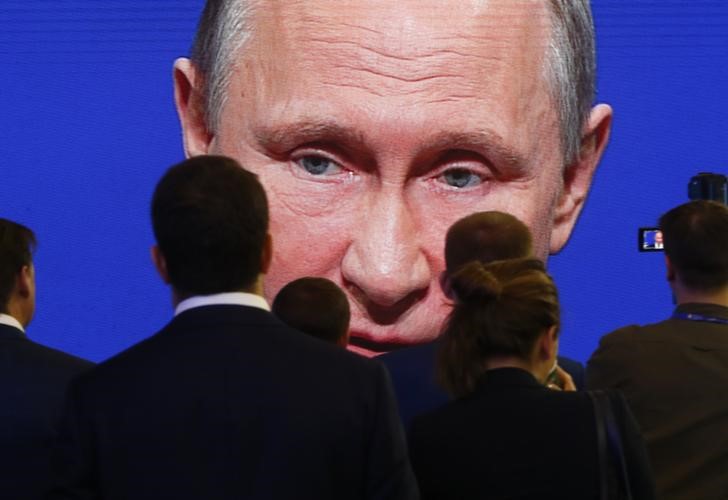(Bloomberg) -- Russian President Vladimir Putin has the U.S. Treasury Department to thank for helping his country prepare for a global economic crisis.
A steady deluge of economic sanctions and the constant threat of more to come has pushed Russia’s authorities to boost reserves and strip back debt over the past five years. As governments across the globe prepare for what’s set to be the worst economic slump since 2008, the fortress approach that had been pushing Russia’s economy into stagnation is starting to look like good foresight.
S&P Global Ratings maintained Russia’s credit rating at BBB- with a stable outlook on Thursday, even as it downgraded a raft of emerging markets due to a plunge in commodity prices.
“Previous crises have taught Russia’s Finance Ministry and central bank how to prepare for this one,” said Karen Vartapetov, an analyst at S&P Global Ratings. “They have a lot of crisis experience.”
To be sure, Russia’s dependence on commodity exports means it won’t escape a global recession. The budget is already being hammered by oil’s plunge to a 17-year low and the ruble is down 22% this year.
Russia moved toward national orders banning residents from leaving their homes except for emergencies due to the spread of coronavirus, with limits taking effect Monday in Mosow and several other regions. The economy could shrink by 5%-10% this year if a full lockdown is imposed, according to a worst-case scenario being discussed by the government.
Sanctions imposed by the U.S. and European Union over Russia’s 2014 annexation of Crimea block many state-owned companies from raising debt abroad, while a measure taken by Washington last year prevents U.S. investors from buying non-ruble government debt. The penalties have left Russia with one of the lowest debt-to-GDP ratios in emerging markets. Finance Minister Anton Siluanov said last year that Russia has enough reserves to allow it to survive without borrowing for at least a year.
Meanwhile, the Finance Ministry has been funneling excess revenues from taxes on oil exports into a giant rainy-day fund, making Russia’s international reserves the fourth biggest in the world. So far Putin hasn’t shown much inclination to tap the funds as virus stimulus, announcing instead a plan to boost the budget through taxes on dividends and large bank deposits.
Russia’s continual crisis preparations have come at a cost to the economy, which has stagnated in the past five years. Before the coronavirus outbreak and slump in global oil prices, Putin had promised to boost living standards this year by bumping up spending.
One of Russia’s responses to sanctions in 2014 was to place restrictions on imports of certain foodstuffs from the U.S. and Europe. While the measure led to a sharp rise in domestic prices, it also increased farm production, leaving Russia more resilient to distruptions in global trade.
“Russia is well prepared for this very new phase of closed borders and closure of international trade and financial processes,” said Sofya Donets, a Moscow-based economist at Renaissance Capital. “It has abundant state buffers and a higher share of local products than it had previously for many consumer goods.”
©2020 Bloomberg L.P.
